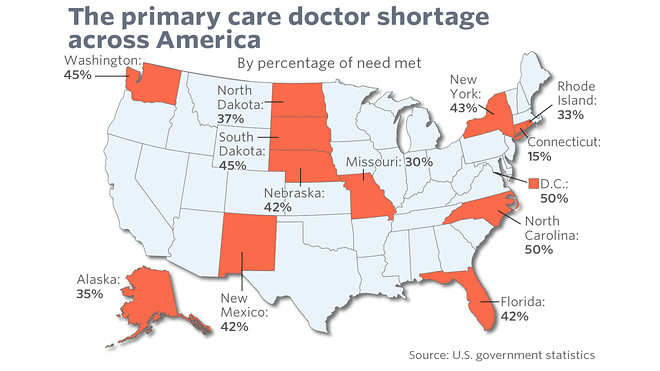

Our financial advisor tasked my husband and me with guessing the age at which I would retire from my job as a family physician. In 2013, we decided that my retirement age was going to be 65. By 2018, I revised my retirement age to 55. I estimated that my career was going to be cut short by at least 10 years if I remained in the increasingly stressful environment of a large corporate healthcare system. I left my “Big Health” job and opened my Direct Primary Care (DPC) office, Noreta Family Medicine, in July 2020. Despite opening a small business during a pandemic, I feel that I could continue practicing in this model as long as I am able to, perhaps beyond my original predicted retirement age of 65.
My anecdote above provides one example of why DPC is a solution to the shortage of primary care physicians. The flexibility and lower-stress environment of DPC may lengthen a physician’s career by increasing fulfillment and improving their own health. Currently, many primary care physicians are subject to micro-management by corporate healthcare systems who’s focus on numbers and check-boxes stresses both patients and physicians. This burden is one reason why 13% of surveyed physicians in 2016 reported that they were planning on pursuing non-clinical jobs. Furthermore, physicians who have many personal responsibilities (working parents, caregivers) may choose to work in a DPC office instead of working in an unfulfilling part-time job outside of primary care, thus increasing the primary care physician workforce.
It is widely stated that 50% of physicians suffer from burnout. Burnout can cause physicians to be “absent while present,” thereby indirectly contributing to the primary care shortage. Some physicians feel pressure to move on to the next patient which prevents them from providing fully attentive care to the patient sitting in front of them. Distracted patient care may lead to more patient urgent care or emergency room visits, defeating the purpose of having a primary care physician. The DPC membership model provides revenue stability for physicians and naturally decreases the pressure to see “X” number of patients per day. Cultivation of patient-physician relationships in the DPC setting leads to a decrease in burnout and an increase in quality of care.
I also strongly believe that the number of primary care physicians will grow if we can show medical students just how happy and fulfilled both DPC physicians and their patients are. As my DPC practice grows, I see potential for it to be a wonderful learning site for medical students. Longer patient visits will translate into more teaching time. A positive primary care experience for a 3rd-year medical student will surely translate into more students choosing to pursue primary care. Medical students will be shocked to learn just how freeing and flexible a career as a DPC doctor can be. Home visits? Sure! Dispensing medicines? Yes! Complex billing questions from patients? No way!
Be part of the solution, advocate for DPC!
Melissa Boylan, MD, FAAFP is the owner of Noreta Family Medicine in Columbia, SC